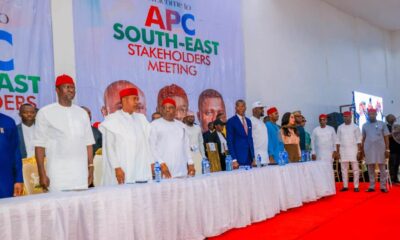GRTech
SAP initiative ‘Africa Code Week’ trains over 500 teachers in Edo State


In 2018, over one thousand teachers will benefit from Africa Code Week (ACW) information and communication technology (ICT) training in Edo and Enugu States.
The train the trainer program is part of activities for this year’s 2-week-long ACW in Nigeria and many other African Countries meant to run in every 35countries from 15 -26 October.
Already, ACW team trained 512 teachers, 26 staff of the ICT Agency of the Edo State government and 32 students from local Universities have been trained in Benin City, next stop is Enugu on 3rd & 4th September where additional 500 teachers are set to be trained.
Launched in 2015 by SAP, in partnership with the Cape Town Science Centre and the Galway Education Centre, Africa Code Week is an initiative that brings together hundreds of schools, teachers, governments, businesses and non-profit organisations with the aim to empower young peopleacross Africa with digital literacy skills.


The teachers
Working closely with private, public and non-profit partners to drive sustainable learning impact across Africa, the Initiative has benefitted 1.8 millionyoung Africans so far.
Today, it enjoys strong partnerships with the public, private and non-profit sectors are the driving force behind the initiative’s ambitious goals and ability tobuild community capacity in ICT education across an entire continent.
ACW is now actively supported by key partners UNESCO YouthMobile, Google, Camden Trust and the German Federal Ministry forEconomic Cooperation and Development (BMZ), 15 African governments, over 150 partners and 100 ambassadors across the continent.
With a goal to empower 70,000+ teachers and positively impact the lives of 2 million young Africans by 2020, ACW is built to be sustainable andprovide long-term impact.
Commenting on the program, Edo State Governor, His Excellency, Godwin Obaseki affirmed that he’s focused on building capacity in the area ofeducation development. The Governor expressed his appreciation to SAP, Google, UNESCO and other partners for bringing Africa Code Week to EdoStates as this will serve as a catalyst for achieving great success in the State’s digital literacy plan.
To underpin the government’s commitment to Africa Code Week, all senior state executives attended the event to provide support and inspiration tothe teachers.
These include but not limited to the following: Rt.Hon.Gabriel E. Oiboh Chairman Post primary Education board (PPEB); Miss Yuwa Naps ExecutiveDirector, Training and Exams Services, ICT Agency; Mrs. Gladys Idahor Head of Service; Mr. Taiwo Akerele, Chief of Staff; Dr. Adesotu, Commissionerfor Science and Technology and Mr. Emmanuel Agbale, Commissioner for Education.
Speaking on the preparations for 2018 edition, Nigeria’s Coordinator of Africa Code Week, Mr. Olajide Ademola-Ajayi, said that annually, SAParrange Train-the-Teacher sessions (TTTs) that are organized either by the Africa Code Week team or partnering Ministries and non-profit partners inthe run-up to October events.
“With 72 students engaged by every trained teacher on average, ACW TTTs are key multiplier and enabler for digital skills to become core pillar of basiceducation in each participating country. So, we are excited about Edo and Enugu State Governments’ acceptance to work with us and other partners to digitally impact both the teachers and students.
Mr. Ademola-Ajayi said that participants should expect to gain knowledge in creative computing through hands-on, playful learning, that typifies AfricaCode Week- the coding enablement program for Africa’s teeming young generation.
Since 2015, Africa Code Week saw over 1.8 million youth introduced to coding skills across 35 countries in 2015, beating yearly initial targets by ahuge margin.
Also, over 5,000 free coding workshops have been organized continent-wide and online since day one, ranging from Scratch all the way to Webprogramming.
In preparation every edition, SAP has deployed its own IT skilled volunteers to train over 25,000 teachers, parents and local volunteers over the pastthree years, all over Africa.


Participants
With average female participation reaching 46.5%, ACW also makes huge strides towards empowering girls in the digital century and fostering gender equality in African ICT education.
With 390,046 youth introduced to coding during ACW 2017 and the highest engagement ratio of 1,622 youth engaged per 100,000 population.










